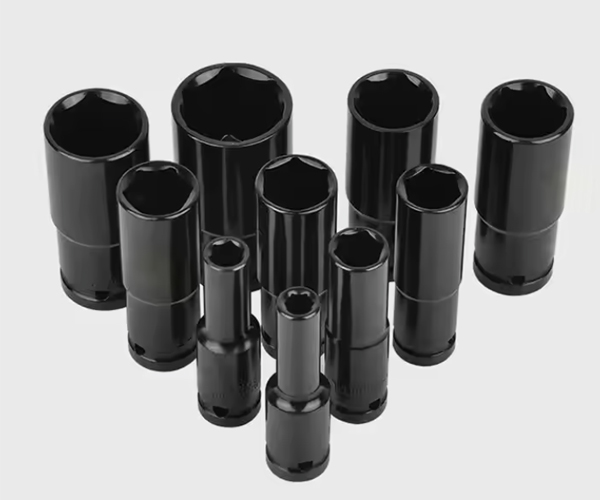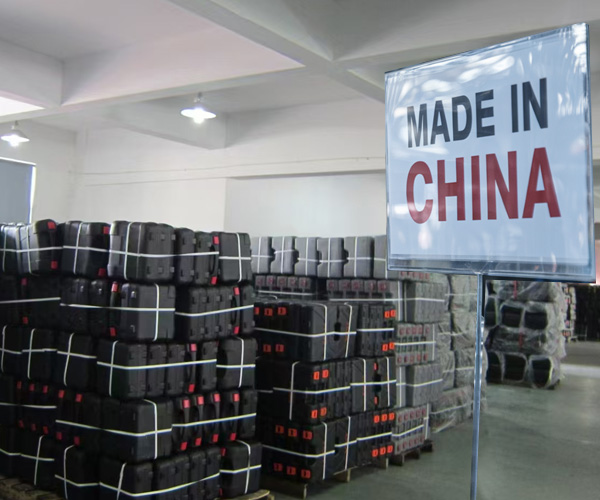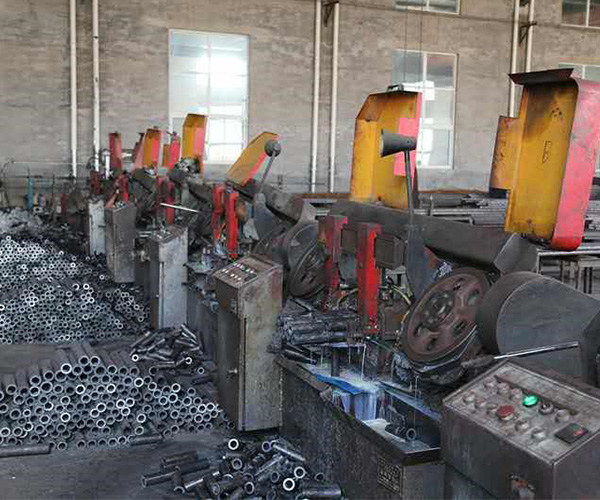Introduction
When it comes to mechanical tasks, especially automotive repairs, sockets are indispensable tools in every toolkit. They make it easier to tighten or loosen nuts and bolts, allowing for efficient repairs and maintenance. However, not all sockets are created equal, and choosing the right one can make a significant difference in both the performance and safety of a task. This guide delves into the differences between impact sockets and regular sockets, examining which is the better choice depending on your needs. Whether you’re a professional mechanic or a DIY enthusiast, understanding these distinctions will help you make informed decisions, ensuring that your work is not only effective but also safe.
The goal of this article is to provide a comprehensive comparison between impact and regular sockets, highlighting their advantages, limitations, and ideal use cases. By the end, you’ll be better equipped to choose the right socket for your next project, ensuring optimal results every time.
What Are Sockets?
Sockets are mechanical tools that attach to a ratchet or wrench to turn fasteners like nuts and bolts. They are cylindrical in shape, with one end designed to fit a specific size of fastener, while the other end connects to the drive tool. Sockets allow users to apply torque more effectively than an open-ended wrench, making them essential for various applications, from automotive repairs to assembling furniture. The correct socket can simplify tasks, saving time and effort.
Types of Sockets Overview
Sockets come in various types, each suited to different tasks. Some common types include:
- Impact Sockets: Designed for use with impact tools like air wrenches or electric impact drivers, they are made from tougher materials to withstand the high torque levels.
- Regular Sockets: Also known as hand sockets, these are typically used with manual ratchets for light to medium-duty tasks.
- Deep Sockets: Feature a longer length to access fasteners located in recessed positions.
- Shallow Sockets: Standard-sized sockets that work for fasteners in accessible areas.
- Hex and Bi-Hex Sockets: Designed to fit fasteners with six-sided (hexagonal) or twelve-sided (bi-hexagonal) shapes.
Why Choosing the Right Socket Matters
Selecting the correct socket for your task is crucial for various reasons. Using an inappropriate socket can lead to rounded bolt heads, damaged tools, or even injury. For example, regular sockets are not built to handle the high torque exerted by impact tools, and using them in such situations could cause them to crack or shatter. Understanding the differences between socket types will not only improve your work quality but also extend the life of your tools.
What is an Impact Socket?
Impact sockets are specialized tools designed for high-torque applications. Made from durable materials like chrome-molybdenum steel, they are capable of withstanding the intense force generated by impact wrenches and drivers. Their robust construction features thicker walls compared to regular sockets, which helps to distribute the force more evenly and reduces the risk of cracking or breaking.
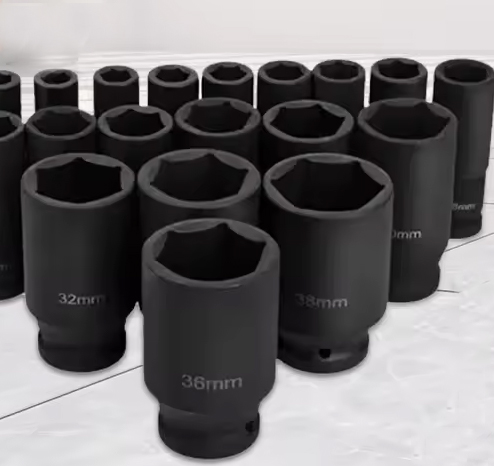
Typical Uses
Impact sockets are commonly used in settings where high torque is required, such as:
- Automotive Repairs: Ideal for loosening lug nuts, suspension bolts, and other tightly fastened components.
- Heavy Machinery Maintenance: Useful for industrial equipment repairs where high-torque settings are necessary.
- Construction Applications: Suitable for assembling or disassembling heavy-duty structures like scaffolding.
Advantages of Impact Sockets
- Durability and Strength
Impact sockets are built to last. Their construction from chrome-molybdenum steel provides superior toughness, making them resistant to wear and tear. This is especially important in professional settings where tools are used repeatedly under harsh conditions. The material can absorb shocks without deforming, ensuring long-term reliability. - High Torque Handling
The thicker walls of impact sockets allow them to handle the high torque levels exerted by impact wrenches. This makes them ideal for tasks that involve removing stubborn, rusted, or over-tightened bolts. The extra strength helps avoid socket deformation and fastener damage. - Safety
Impact sockets are safer to use with impact tools because they are designed to withstand sudden force. Using a regular socket with an impact wrench poses the risk of socket fragmentation, which could cause serious injury. Impact sockets minimize this risk thanks to their robust construction. - Versatility
While they are specifically designed for impact tools, impact sockets can also be used with manual ratchets. This makes them versatile, as a single set can cover a wide range of tasks without compromising safety or performance.
Limitations of Impact Sockets
- Weight
Due to their thicker walls and sturdier materials, impact sockets tend to be heavier than regular sockets. While this may not be an issue for most users, it can cause fatigue during prolonged tasks or when working in tight spaces where lighter tools are easier to maneuver. - Cost
Impact sockets are generally more expensive than regular sockets. Their higher cost can be attributed to the materials used and the specialized manufacturing process required to ensure they meet safety standards for high-torque applications. For users who do not frequently work with impact tools, the additional expense may not be justifiable.
What is a Regular Socket?
Regular sockets, often referred to as hand sockets, are designed for general use with manual tools like ratchets and wrenches. Made from chrome-vanadium steel, they are suitable for light to medium-duty tasks where high torque levels are not required. Regular sockets have thinner walls compared to impact sockets, making them lighter and easier to handle in routine applications.
Typical Uses
Regular sockets are versatile and widely used for:
- DIY Projects: Ideal for common household tasks such as assembling furniture, repairing bicycles, or adjusting fixtures.
- Automotive Maintenance: Suitable for light vehicle repairs, where torque requirements are within the capabilities of manual ratchets.
- Home Repairs: Perfect for tasks like tightening plumbing fixtures, securing electrical boxes, or working on appliances.
Advantages of Regular Sockets
- Lightweight Design
The thinner walls and lighter materials make regular sockets easier to handle, especially in tasks that require frequent tool changes or work in tight spaces. The reduced weight helps reduce hand fatigue over long periods of use. - Affordability
Regular sockets are less expensive than impact sockets, making them an excellent choice for users who need a basic set of tools for occasional use. Their cost-effectiveness is ideal for DIY enthusiasts or individuals on a budget. - Variety of Sizes and Styles
Regular sockets are available in a wide range of sizes, drive types, and configurations, providing flexibility for various tasks. Users can easily find sets tailored to specific applications, such as metric or SAE sizes, deep or shallow designs, and more. - Smoother Finish
The chrome-plated finish of regular sockets not only gives them a polished appearance but also makes them easier to clean. The finish provides a degree of corrosion resistance, which is useful for tools stored in garages or toolboxes.
Limitations of Regular Sockets
- Not Suitable for Impact Tools
Regular sockets are not built to handle the high forces exerted by impact wrenches or other power tools. Using them in such settings can lead to socket cracking or shattering, posing a safety hazard. - Limited Durability in High-Torque Applications
The thinner walls of regular sockets make them more susceptible to wear and damage when used in high-torque situations. They are best reserved for light-duty tasks where manual torque is sufficient.
Comparing Impact and Regular Sockets
Understanding the differences between impact sockets and regular sockets can help you decide which one to use for specific tasks. Here’s a closer look at how these two types of sockets compare in terms of material, structure, durability, cost, and overall performance.
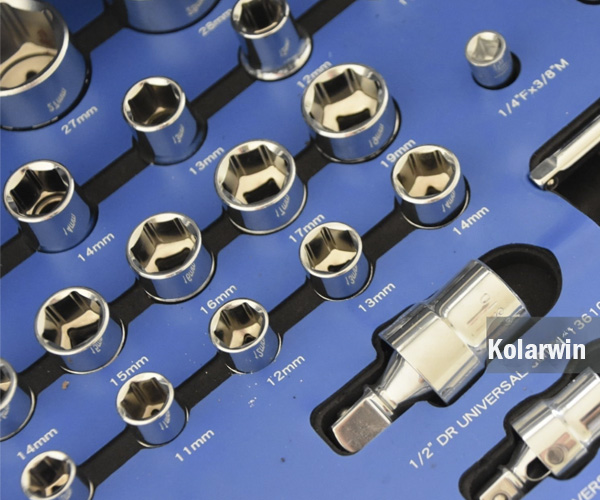
Material Differences
- Impact Sockets:
Impact sockets are typically made from chrome-molybdenum steel, a material known for its toughness and ability to handle stress without cracking. Chrome-molybdenum steel can withstand the sudden jolts of torque produced by impact tools, making it an ideal choice for heavy-duty applications. The dark black oxide finish commonly seen on impact sockets helps to prevent corrosion and enhances their durability. - Regular Sockets:
Regular sockets are usually made from chrome-vanadium steel, which offers sufficient strength for hand tool applications. This material is more lightweight than chrome-molybdenum steel, which is beneficial for tasks that don’t require extreme torque. The chrome-plated finish on regular sockets not only provides corrosion resistance but also gives them a polished, professional look.
Structural Differences
- Thicker Walls in Impact Sockets:
Impact sockets have thicker walls to distribute torque evenly, reducing the risk of the socket splitting. This structural design allows them to absorb the shock generated by impact tools effectively. - Thinner Walls in Regular Sockets:
The thinner walls of regular sockets make them lighter and more compact, which is useful for reaching fasteners in tight spaces. However, this also means that they are not suitable for high-torque situations where the thinner walls could lead to breakage.
Durability and Longevity
- Impact Sockets:
Due to their construction from tougher materials, impact sockets last longer when used in high-torque applications. They can endure repeated impacts without cracking or wearing down quickly, making them a better investment for professionals who frequently use power tools. - Regular Sockets:
Regular sockets can also be durable but are more prone to wear and damage if used in demanding applications. They are ideal for tasks that involve manual torque rather than the forceful impacts of power tools.
Cost Considerations
- Impact Sockets:
The robust design and premium materials used in manufacturing impact sockets contribute to their higher cost. While they are more expensive upfront, the investment pays off in professional settings where durability and safety are paramount. - Regular Sockets:
Regular sockets are more affordable due to their simpler construction and materials. For users who do not require sockets for heavy-duty tasks, regular sockets offer a budget-friendly solution.
Performance in Different Applications
- Impact Sockets in Automotive and Industrial Use:
The thicker walls and durable materials make impact sockets suitable for automotive work, such as removing lug nuts or performing suspension repairs. They also excel in industrial settings where heavy machinery maintenance involves high-torque applications. - Regular Sockets for DIY and Light Repairs:
Regular sockets perform well in tasks that involve hand tools, such as assembling furniture, performing light vehicle maintenance, or fixing household items. Their lightweight design and variety make them versatile for a range of simple applications.
Safety Considerations
Using the correct type of socket is essential for safety, especially when working with power tools. Here are some key safety considerations when choosing between impact and regular sockets.
Why Using the Correct Socket is Crucial for Safety
Sockets are designed to handle specific levels of torque. Using a regular socket on an impact tool can result in the socket shattering, sending metal fragments flying. This can cause serious injury or damage to nearby equipment. Impact sockets are made to withstand the stress and are thus the only safe choice for high-torque power tools.
Signs of Socket Wear and When to Replace Them
Regular inspection of sockets is important to ensure safety. Here are some indicators that a socket may need replacement:
- Visible Cracks or Chips: Cracks in the metal are a sign that the socket is compromised and should not be used.
- Worn or Deformed Drive Ends: If the drive end appears rounded or worn, the socket may not fit securely on the tool, increasing the risk of slipping.
- Corrosion: While rust on the outside may seem cosmetic, extensive corrosion can weaken the socket’s structural integrity.
Common Mistakes to Avoid
- Using Regular Sockets with Impact Tools: Never use regular sockets with power tools that generate high torque. They are not built for such applications and can shatter under stress.
- Over-Tightening with Regular Sockets: Applying excessive force with a regular socket can cause it to warp or crack. Always ensure you are using a socket appropriate for the task at hand.
When Should You Choose an Impact Socket?
There are several scenarios where an impact socket is the ideal choice.
Professional Settings
For professionals who work in automotive repair shops, industrial maintenance, or construction, impact sockets are a must-have. The high-torque levels in these environments necessitate tools that can withstand the repeated stress without failing. Professionals benefit from the durability and safety offered by impact sockets.
Frequent Use with Impact Tools
If you regularly use air wrenches, electric impact drivers, or similar power tools, impact sockets are essential. They can handle the continuous impact generated by these tools without becoming damaged, ensuring a longer tool life and safer operation.
Handling High-Torque Fastening or Loosening Tasks
When dealing with rusted bolts or high-torque applications, impact sockets provide the extra strength needed to get the job done. They are built to withstand sudden force without cracking, making them the preferred choice for heavy-duty tasks.
When Should You Choose a Regular Socket?
Regular sockets may not be as heavy-duty as impact sockets, but they still have plenty of uses in everyday tasks.
DIY and Home Projects
For most home projects, regular sockets are more than sufficient. Whether it’s tightening screws on furniture, making adjustments on a bicycle, or other household repairs, regular sockets provide the versatility needed for these light-duty tasks.
Low-Torque Applications
When the torque required is within the range of manual ratchets, regular sockets perform adequately. This includes activities such as light automotive repairs (e.g., changing spark plugs), small appliance maintenance, or securing plumbing fixtures.
Budget Constraints
For those who do not work with impact tools regularly, investing in a set of regular sockets is a cost-effective solution. They are affordable and suitable for most non-industrial applications, making them ideal for casual users and hobbyists.
Frequently Asked Questions (FAQs)
Can Impact Sockets Be Used as Regular Sockets?
Yes, impact sockets can be used as regular sockets. They are compatible with manual tools such as ratchets and wrenches, and while they may be heavier than regular sockets, they can still perform the same tasks. Their thicker walls and durable materials mean they can withstand more stress, making them a versatile choice for various applications. However, using impact sockets for general tasks may feel slightly cumbersome due to the additional weight.
What Are the Characteristics of Impact Sockets?
Impact sockets are characterized by their robust construction and thicker walls, which enable them to withstand high torque and sudden force generated by power tools like impact wrenches. Made from tough materials such as chrome-molybdenum steel, they are typically black due to an oxide coating that prevents corrosion. This design makes them suitable for heavy-duty applications and professional settings, where durability and safety are crucial.
What Type of Socket Should I Use?
The choice of socket depends on the task at hand:
- Use Impact Sockets when working with impact tools or in high-torque environments such as automotive or industrial maintenance. They are specifically designed to handle the forces generated by power tools safely.
- Use Regular Sockets for light to medium-duty tasks that involve hand tools like ratchets or wrenches. These sockets are ideal for DIY projects, household repairs, or general mechanical work.
Are Deep Impact Sockets Better Than Regular Sockets?
Deep impact sockets have advantages in specific scenarios. Their extended length allows them to reach fasteners located in recessed areas, making them useful for automotive and machinery repairs where bolts are often positioned deep within components. They combine the benefits of a deep socket’s reach with the strength of an impact socket, making them versatile for various tasks. However, for routine tasks that do not require extra reach, regular sockets may be more convenient due to their lighter weight.
What is a Set of Sockets?
A set of sockets is a collection of sockets of varying sizes and types, typically housed in a case or organizer for easy storage. Socket sets may include different drive sizes (e.g., 1/4″, 3/8″, 1/2″), depths (shallow and deep), and configurations (metric or SAE). Some sets are specialized for impact tools, while others are designed for manual use. A comprehensive socket set can cover a wide range of fastening tasks, from light repairs to heavy-duty applications.
What Are the Disadvantages of Impact Sockets?
Impact sockets do have some downsides:
Less Compact for Tight Spaces: The thicker walls of impact sockets can make them difficult to fit in very tight spaces where a slimmer regular socket would be more suitable.
Heavier Weight: Due to their thicker walls and sturdier materials, impact sockets are heavier than regular sockets. This can make them feel cumbersome during prolonged use or in situations where lighter tools are preferred.
Higher Cost: The specialized materials and design of impact sockets contribute to their higher price compared to regular sockets. For users who only need sockets for occasional light-duty tasks, this may not be cost-effective.
Tips for Choosing the Right Socket
Selecting the appropriate socket involves considering several factors:
Assess Your Project Needs
Determine whether the task requires high torque. For automotive or industrial applications, impact sockets are generally the better choice. For light repairs or DIY tasks, regular sockets may be sufficient.
Tool Compatibility
Make sure the socket set is compatible with the tools you already own. This means considering drive size and ensuring you have the appropriate adapters if needed.
Quality vs. Budget
While impact sockets may be more expensive, they offer superior durability in demanding applications. Regular sockets are affordable and adequate for light-duty work, so choose based on the frequency of use and the level of torque involved in your projects.
Brand and Material Considerations
Reputable brands often provide better warranties and build quality. Look for socket sets that offer both impact and regular sockets if your work involves a variety of tasks.
Care and Maintenance of Sockets
Proper care can extend the life of your sockets, ensuring they remain in good condition.
Cleaning Tips
After use, wipe the sockets clean to remove dirt, grease, and metal shavings. For more thorough cleaning, a degreaser can be used, especially for impact sockets that encounter heavy-duty use.
Storage Recommendations
Store sockets in a dry environment to avoid rust. Use a tool organizer to keep the sockets sorted by size, making them easier to access and reducing wear from rubbing against each other.
When to Replace Sockets
Sockets should be replaced if they show signs of cracking, warping, or excessive wear. Regularly inspect your tools to catch any issues before they become safety hazards.
Conclusion
Choosing between impact and regular sockets depends on the nature of the tasks you need to accomplish. For high-torque, professional applications, impact sockets are the safer and more durable choice. In contrast, regular sockets are ideal for everyday tasks, light repairs, and budget-conscious users. By understanding the differences in material, design, and performance, you can select the right socket for the job and ensure your tools last longer while keeping you safe.
Additional Resources
- Socket Buying Guide: A detailed guide on choosing the best socket set for various applications.
- Related Articles: “Best Impact Wrenches for Automotive Use,” “Hand Tool Maintenance Tips.”
- External Resources: Manuals or safety guides from trusted tool brands like Snap-On and Craftsman.
Thank you for reading this comprehensive guide!!!
If you’re looking for high-quality socket sets for your toolkit, we’ve got you covered! Whether you need impact sockets for heavy-duty tasks or regular sockets for everyday use, our comprehensive socket sets offer the quality and durability you require.
We also provide OEM socket sets, allowing you to customize the tools according to your brand and specifications. Reach out to us today to discuss your requirements, and let us help you find the perfect socket set for your needs. Contact us now to get a quote and take the next step in upgrading your toolkit!


